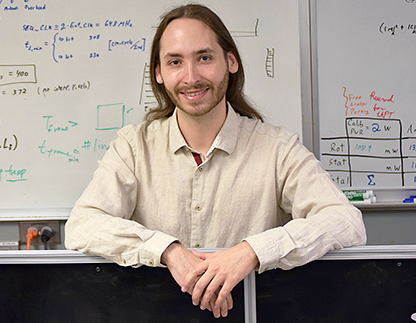I'm proud to have found a path that I love, and to be able to dedicate so much of myself while also helping others find their own paths!”
Julian Gamboa González
PhD Candidate in Electrical and Computer Engineering

Julian Gamboa González is a PhD candidate in Electrical and Computer Engineering in the McCormick School of Engineering. His research focuses on creating optical systems that employ holograms for data gathering and signal processing. Julian is a Presidential Fellow, which is the most prestigious fellowship awarded to graduate students by Northwestern University.
How would you describe your research and/or work to a non-academic audience?
I research how we can use light to measure things and process data. Light has wave properties that carry information: color, intensity, polarization, phase, and direction each tells us something about where the light came from or what it has interacted with. By manipulating beams of light in specific ways, we can either change or extract the data from those properties very precisely! However, doing this is not trivial and requires precise optical and electronic setups.
My research has focused primarily on developing holographic techniques that allow us to make the optical aspects more compact and affordable while simultaneously increasing the speed of the electronic components. The focus of my dissertation is my work on the development of an optoelectronic device that can compare images at ultra-fast speed, as well as the development of a holographic polymer that can store terabytes of information that can be accessed at the speed of light.
What have been some of the most memorable twists and turns of your career?
For the first three years of my PhD, the optoelectronic correlator I've been developing had an issue stabilizing the phase of our reference beams. Last year, my fiancée was coming to visit, and we were going to take engagement photos, but I had to finish a paper for a conference so that I could have some free time while she was around. On the last day before she arrived, while hurriedly working on the paper, I had an epiphany regarding the phase stabilization issue and found a very simple solution to our overly complicated problem. The solution I came up with managed to fix the most unstable and complex issue of the device, and I wouldn't have come up with it if I hadn't been rushing so I could take some time off for a special occasion!
Tell us what inspired your research and/or work.
In my opinion, light is one of the most interesting and beautiful things in our universe. It conveys so much information, it can heat our skin, it can hold up massive stars, yet it has no mass and moves at a speed so mind-bogglingly fast, that we can't even begin to comprehend. I'm fascinated by how we can use this fundamental force to further our human endeavors.
How do you unwind after a long day?
I enjoy long walks and finding solutions to hypothetical problems with friends. I also enjoy building scale models of spaceships and making/designing jewelry.
Tell us about a current achievement or something you're working on that excites you.
I'm currently working on increasing the speed of the optoelectronic correlator I've been working on during my PhD. If all goes well, it should be operating at 180 correlations per second within the next few months and 720 correlations per second soon after that. For reference, a supercomputer running one of the world's fastest machine learning algorithms can perform a similar task at ~80 operations per second.
What are you most proud of in your career to date?
I'm proud to be here; to be so close to completing a PhD with multiple high-quality journal and conference papers from my research. I'm proud to have found a path that I love, and to be able to dedicate so much of myself while also helping others find their own paths!
Published: August 8, 2023
If you know a graduate student, postdoctoral trainee, graduate faculty member, staff member, or a member of our TGS alumni population who would make a great candidate for our TGS Spotlight Series, please complete this brief TGS Spotlight Series Nomination Form.